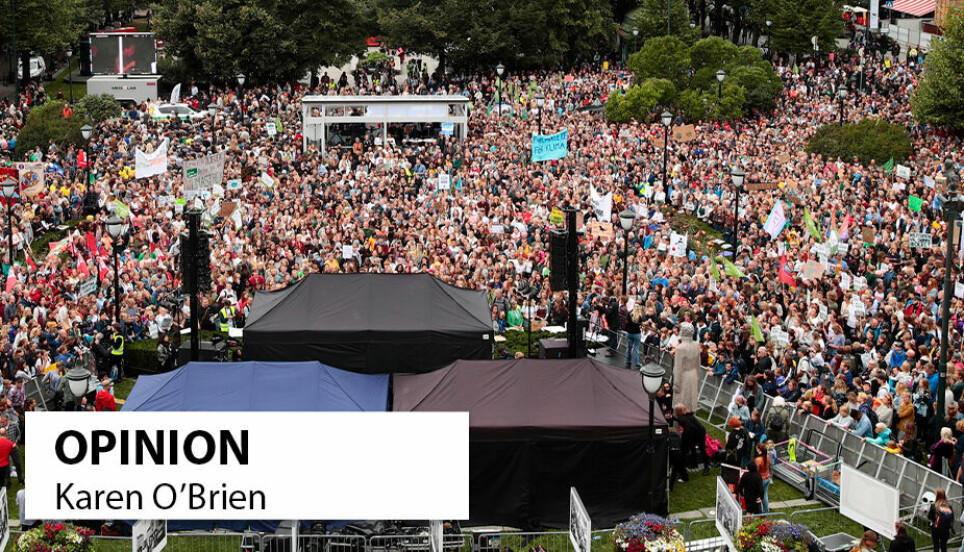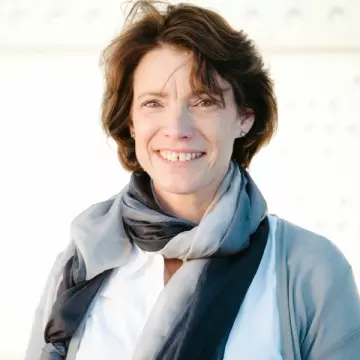Opinion:

Is there any hope of reaching the goals of the Paris Agreement on climate change?
OPINION: Believing that we can achieve the Paris Agreement is not naïve, idealistic, or utopian, according to professor Karen O'Brien.
Is there any hope of reaching the goals of the Paris Agreement on climate change? Many are asking this question in the run-up to the COP27 meeting in Egypt — and many doubt that we have the capacity to transform ourselves, societies, systems, our actions at the rate, scale, speed, and depth that is called for by this important global agreement.
The stakes are high, and research makes it clear that the consequences of failure are truly catastrophic. Still, we are failing to bend the curves for greenhouse gas emissions in a significant way, and we are doing little to reduce risk and vulnerability. No wonder so many people feel despondent.
But wait, are we missing something here? Are we underestimating our individual and collective capacity for the rapid and systemic transformations needed to realize the Paris Agreement?
What’s missing?
Current responses to climate change focus on technical and behavioral changes, or on ways to increase the political will for action. Yet these often tend to perpetuate binaries that view humans as separate from each other and from nature. Such 'us' versus 'other' divisions have contributed to a fragmented world of polarization and policy paralysis, while trivializing the power of individuals to generate equitable and sustainable change.
Meeting the Paris Agreement is a call for you and me to be more than only spectators or observers of change. The combination of urgency and despair tells us that now is the time to take transformations seriously.
What if we approach change in a radically different way, recognizing the power of relationships and the entanglement of our individual and collective agency? Perhaps we’d discover the power of 'quantum social change' and recognize that we matter more than we think!
It’s about getting uncomfortable
First, let’s be honest. Transformative change is not a smooth, comfortable process. It involves getting comfortable with uncertainty and releasing control over outcome. Imagine the caterpillar transforming into a butterfly, but at a global scale.
Without knowing what will emerge from our collective pupa stage, we are tempted to cling to the familiar, rather than to feel vulnerable and exposed. Unfortunately, this comfort comes at a high cost for people and the planet.
Rather than asking whether meeting the Paris Agreement is still possible, we can instead ask how we can rapidly transform in an equitable, ethical, and sustainable manner to achieve this.
Transformative change can be dangerous, especially when it threatens power relationships and those with vested interests in maintaining the status quo. Recent research shows that popular uprisings and protests have become less effective at producing change, in part due to social polarization and fragmentation among movements, which is often orchestrated by those with power and authority.
If protest is no longer an effective approach to transformation – and illegal in some states — we need to consider other ways of engaging with social change and systems change. Mobilization of 'people power' takes on a different approach when we are guided by principles of transformation.
It’s about expanding our perspectives
Transformations involve expanding our perspectives, rather than narrowing or limiting them, or 'hunkering down' to defend our own. Recently, I received an email from a group of academics who are convinced that another report or journal article is not going to make any difference to the climate emergency that we are facing.
They are skeptical to approaches that encourage optimism, arguing that it lures the public into believing that an implausible climate goal can still be met. Instead, they advocate «stubborn realism», which recognize our collective failure and points to the inevitability of missing the 1.5°C temperature goal.
The problem is that 'stubborn realism' is based on a perspective that does not adequately consider our full potential for generating social change. There is a rich body of research from the social sciences and humanities that challenges a reductionist, deterministic, and dualistic view of reality. This research offers us new perspectives on transformations that move us from stubborn realism to 'participatory realism'.
It’s about relationships
At its roots, climate change is a relationship problem. A key factor in transformations is how we relate to ourselves, each other, nature, and the future. Systems are made up of relationships, and our actions, conversations, shared values, meaning, ideas, and emotions have the potential to transform relationships, shift patterns, and influence systems.
How do we currently relate to change? In the political realm, we tend to approach change in a dualistic and causal manner that assumes a clear distinction between us and other, local and global, bottom up and top down, costs and benefits, etc. This leads to polarization, fragmentation, and partial solutions that never seem to change anything. Doing more of the same is unlikely to produce different results.
It’s about asking better questions.
Albert Einstein once said, "Don’t listen to the person who has the answers; listen to the person who has the questions." Good questions generate new thoughts and ideas. If the answers lie in the questions, asking better questions can give us better answers.
Contrary to what we see in the news these days, we do not live in a black and white, predetermined world. This illusion leaves us feeling we have little agency or influence. Moving beyond yes/no and right/wrong questions makes room for critical and creative thinking.
The scale of the challenges facing us today is truly unprecedented, but unprecedented does not mean impossible; rather, it means something we just haven’t encountered or imagined before.
Rather than asking whether meeting the Paris Agreement is still possible, we can instead ask how we can rapidly transform in an equitable, ethical, and sustainable manner to achieve this. This opens us to new stories, ideas, initiatives, and expressions of political agency, and reminds us that individuals and groups have always used creativity, collaboration, and courage to challenge the status quo.
It’s about doing things differently
Transformation is not about starting over, as if nothing today is working. It may involve doing different things, but more often it is about doing things differently. It means showing up, strategizing, designing, and implementing in ways that transcend the divisive beliefs and ideologies that perpetuate polarization and fragmentation, such as racism, sexism, classism, elitism, and anthropocentrism.
This involves recognizing that we are both individuals and collectives who are an entangled part of a much larger field of change. When we embody different ways of thinking and relating to social change, we have the power to shift cultures and systems at scale. Not in the future, but now.
Believing that we can achieve the Paris Agreement is not naïve, idealistic, or utopian. We know that metamorphosis does not happen through hope or wishful thinking – it is a non-linear process.
Whereas 'stubborn realism' is likely to keep us moving forward at a caterpillar’s pace, participatory realism recognizes you, me, and all of us to be a powerful force for transformative change.
FURTHER READING:
Share your science or have an opinion in the Researchers' zone
The ScienceNorway Researchers' zone consists of opinions, blogs and popular science pieces written by researchers and scientists from or based in Norway. Want to contribute? Send us an email!































